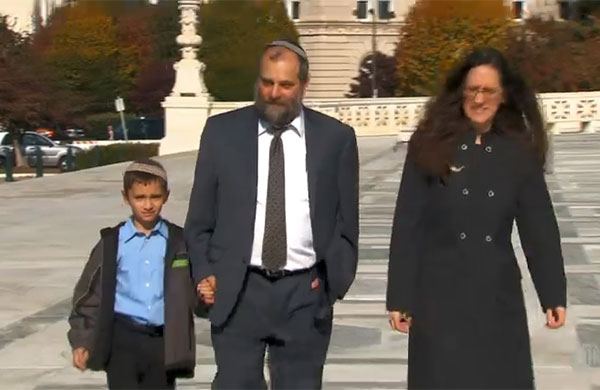
(CNN)The Supreme Court struck down part of a federal statute Monday that allowed Americans born in Jerusalem to record in their passport “Israel” as the place of birth.
The 6-3 decision is a victory for the Executive, and a loss for Congress and the 12-year-old boy caught in the middle of a separation of powers dispute.
For the last 60 years, the United States policy has been to recognize no state as having sovereignty over Jerusalem.
Justice Anthony Kennedy, who wrote the opinion, held that “over the last 100 years, there has been scarcely any debate over the President’s power to recognize foreign states.” Kennedy said that it was “clear” that in the statute at issue in the case, “Congress wanted to express its displeasure with the President’s policy, by among other things, commanding the Executive to contradict his own, early stated position on Jerusalem. This Congress cannot do.”
Kennedy said that the President has the exclusive power to grant formal recognition to a foreign sovereign and said that the law infringes on the Executive’s “consistent” decision to withhold recognition with respect to Jerusalem.
“Recognition is an act with immediate and powerful significance for international relations, so the President’s position must be clear. Congress cannot require him to contradict his own statement regarding a determination of formal recognition,” Kennedy wrote for the Court’s majority.
In dissent were Chief Justice John Roberts, Justice Antonin Scalia and Justice Samuel Alito.
Roberts, in a dissent joined by Alito, said “Today’s decision is a first: Never before has this Court accepted a President’s direct defiance of an Act of Congress in the field of foreign affairs.”
Roberts said “the statue at issue does not implicate recognition” but “simply gives an American citizen born in Jerusalem the option to designate his place of birth as Israel for the purposes of passports and other documents.”
Scalia took the rare step of reading part of his dissent from the bench, which was joined by Roberts and Alito, saying that the law at issue “merely requires the State Department to list a citizen’s birthplace as Israel” and does not require the President to make “any other kind of legal commitment.”
“Today, the Supreme Court confirmed something that lower courts and scholars had long assumed—that the power to recognize foreign governments (and their territory) resides exclusively with the Executive Branch,” said Stephen I. Vladeck, an analyst for CNN and a law professor of the American University Washington College of Law. “This is not only a landmark win for presidential power over foreign affairs, but a rather decisive loss for Congress—which passed the statute at issue entirely to thwart a half-century-old Executive Branch policy,” he said.
Legal experts have been closely watching the case eager to see how the Court would resolve the separation of powers dispute.
Caught in the middle was a 12-year-old boy, Menachem Zivotofsky. When he was born his parents sought to have “Israel” listed on his U.S. passport as his place of birth pursuant to a federal law. But the State Department refused.
For the last 60 years, the United States policy has been to recognize no state as having sovereignty over Jerusalem. In 2002 when Congress passed the Foreign Relations Authorization Act, President George W. Bush signed the law but issued a statement saying he objected to section 214 at issue in today’s case.
In Court, Solicitor General Donald B. Verrilli said that Congress can’t use its authority to regulate passports “to command the Executive branch to issue diplomatic communication that contradicts the government’s official position on recognition.”
He noted that the question of the status of Jerusalem “is the most vexing and volatile and difficult diplomatic issue that this nation has faced for decades.”
“The nations in the region, and frankly people around the world and governments around the world scrutinize every word that comes out of the United States Government and every action that the United States Government takes in order to see whether we can continue to be trusted as an honest broker who could stand apart from this conflict and help bring it to resolution,” he said.
But Zivotofsky’s lawyers framed the case differently. Alyza D. Lewin said the case is not about formal recognition, but simply how an American is identified on his or her passport.
“We do not claim this is recognition,” she said at oral arguments.
Justice Elena Kagan seemed to side with the State Department at oral arguments.
“History suggests,” she said, “that everything is a big deal with respect to the status of Jerusalem. And right now, Jerusalem is a tinderbox because of issues about the status of and access to a particular holy site there.”
Scalia argued the other side saying that Congress is entitled to do what is authorized under the Constitution and “the fact that the State Department doesn’t like the fact that it makes the Palestinians angry is irrelevant.”
The 12-year-old boy was in court to hear arguments on the major separation of powers case that featured his name. After arguments he told reporters, “I’m an Israeli, and I want people to know that I’m glad to be an Israeli.”



